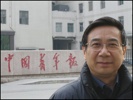Although just a fraction of all Chinese go online — and most who do play games, download music or gossip with friends — widespread Internet use in the nation’s largest cities and among the educated is changing the way Chinese learn about the world and weakening the Communist Party’s monopoly on the media. Studies show China’s Internet users spend more time online than they do with television and newspapers, and they are increasingly turning to the Web for news instead of traditional state outlets.
The government has sought to control what people read and write on the Web, employing a bureaucracy of censors and one of the world’s most technologically sophisticated system of filters. But the success of those measures has been mixed. As a catalyst that amplifies voices and accelerates events, the Internet presents a formidable challenge to China’s authoritarian political system. Again and again, ordinary Chinese have used it to challenge the government, force their opinions to be heard and alter political outcomes.
The influence of the Web has grown over the past two years, even as President Hu Jintao has pursued the country’s most severe crackdown on the state media in more than a decade. The party said last week that Freezing Point would resume publishing, but Li and a colleague were fired, making them the latest in a series of editors at state publications to lose their jobs.With newspapers, magazines and television stations coming under tighter control, journalists and their audiences have sought refuge online. The party’s censors have followed, but cyberspace in China remains contested terrain, where the rules are uncertain and an eloquent argument can wield surprising power.
A full translation of Li Datong’s original letter to Li Erliang is available via ESWN. See also “War of the words” from the Guardian.








